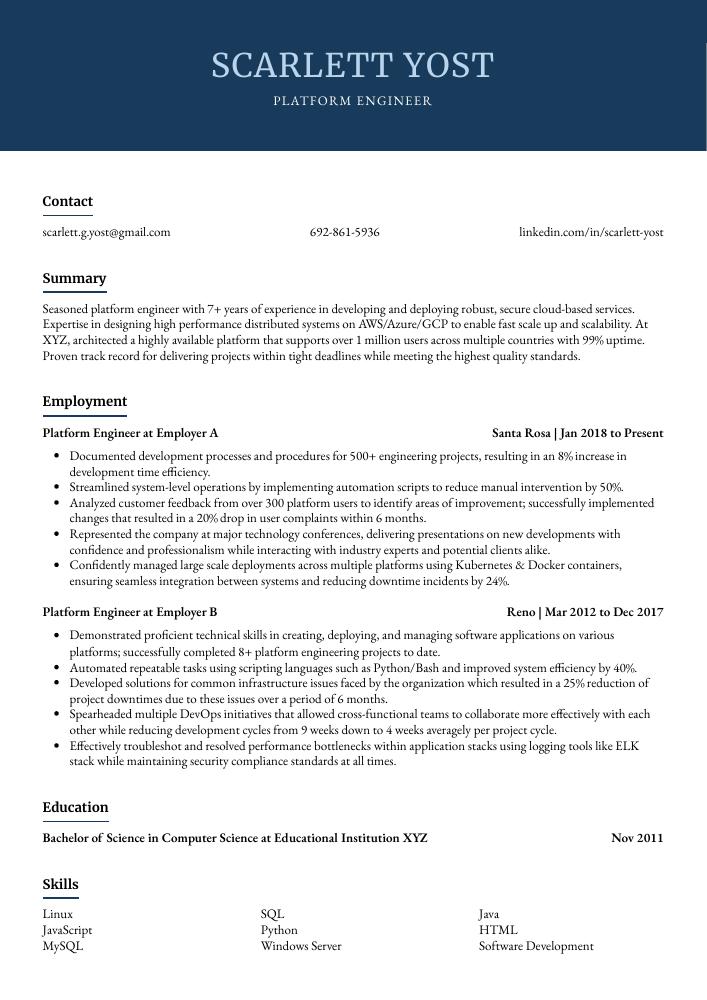Platform Engineer Resume Guide
Platform Engineers design, develop and maintain software platforms. They work with various technologies to create a platform that is secure, reliable and scalable for users of the applications built on top of it. Platform Engineers are responsible for ensuring performance, debugging any issues that arise as well as developing new features or making enhancements to existing ones.
Platform engineering is your passion, and you have the knowledge to prove it. To get noticed by hiring managers in this field, you must write a resume that clearly demonstrates your skills and experience.
This guide will walk you through the entire process of creating a top-notch resume. We first show you a complete example and then break down what each resume section should look like.
Table of Contents
The guide is divided into sections for your convenience. You can read it from beginning to end or use the table of contents below to jump to a specific part.
Platform Engineer Resume Sample
Scarlett Yost
Platform Engineer
[email protected]
692-861-5936
linkedin.com/in/scarlett-yost
Summary
Seasoned platform engineer with 7+ years of experience in developing and deploying robust, secure cloud-based services. Expertise in designing high performance distributed systems on AWS/Azure/GCP to enable fast scale up and scalability. At XYZ, architected a highly available platform that supports over 1 million users across multiple countries with 99% uptime. Proven track record for delivering projects within tight deadlines while meeting the highest quality standards.
Experience
Platform Engineer, Employer A
Santa Rosa, Jan 2018 – Present
- Documented development processes and procedures for 500+ engineering projects, resulting in an 8% increase in development time efficiency.
- Streamlined system-level operations by implementing automation scripts to reduce manual intervention by 50%.
- Analyzed customer feedback from over 300 platform users to identify areas of improvement; successfully implemented changes that resulted in a 20% drop in user complaints within 6 months.
- Represented the company at major technology conferences, delivering presentations on new developments with confidence and professionalism while interacting with industry experts and potential clients alike.
- Confidently managed large scale deployments across multiple platforms using Kubernetes & Docker containers, ensuring seamless integration between systems and reducing downtime incidents by 24%.
Platform Engineer, Employer B
Reno, Mar 2012 – Dec 2017
- Demonstrated proficient technical skills in creating, deploying, and managing software applications on various platforms; successfully completed 8+ platform engineering projects to date.
- Automated repeatable tasks using scripting languages such as Python/Bash and improved system efficiency by 40%.
- Developed solutions for common infrastructure issues faced by the organization which resulted in a 25% reduction of project downtimes due to these issues over a period of 6 months.
- Spearheaded multiple DevOps initiatives that allowed cross-functional teams to collaborate more effectively with each other while reducing development cycles from 9 weeks down to 4 weeks averagely per project cycle.
- Effectively troubleshot and resolved performance bottlenecks within application stacks using logging tools like ELK stack while maintaining security compliance standards at all times.
Skills
- Linux
- SQL
- Java
- JavaScript
- Python
- HTML
- MySQL
- Windows Server
- Software Development
Education
Bachelor of Science in Computer Science
Educational Institution XYZ
Nov 2011
Certifications
AWS Certified Solutions Architect – Professional
Amazon Web Services
May 2017
1. Summary / Objective
Your resume summary should be a concise overview of your experience and qualifications as a platform engineer. In this section, you can highlight the technical skills that make you stand out from other candidates; for example, mentioning your expertise in developing cloud-native applications or working with Kubernetes clusters. You could also mention any recent certifications related to platform engineering that demonstrate your commitment to staying up-to-date on industry trends.
Below are some resume summary examples:
Hard-working platform engineer with 5+ years of experience in designing, developing, and maintaining software platforms. Gained expertise in creating applications using NodeJS, React JS/Redux, and Python while working on various projects at XYZ. Skilled in debugging issues related to performance optimization and scalability. Improved the user experience by 30% through implementing new features like real-time data streaming capabilities on ABC platform.
Energetic platform engineer with 5+ years of experience developing, maintaining, and troubleshooting large-scale distributed systems. Skilled in defining and implementing platform architecture that can scale to meet industry demands. At XYZ Company managed the development process for a highly available system incorporating microservices architecture on AWS cloud infrastructure. Received award from CTO for contribution to improving availability by 95%.
Diligent platform engineer with 5+ years of experience developing and managing enterprise-level platforms. Skilled in multiple programming languages and frameworks, such as Java, Node. Js, ReactJS and MongoDB to provide solutions for large scale cloud infrastructures. At XYZ Company developed a multi-site platform that improved overall performance by 20%. Received the “Best Engineer” award from ABC Corporation for exemplary work on the project.
Determined platform engineer with 7+ years of experience developing, deploying, and managing cloud-native technologies. Certified AWS Solutions Architect Professional eager to join ABC’s team as a platform engineer. Previous successes include increasing application uptime by 23% while reducing infrastructure costs by 15%. Also identified and resolved an issue that caused performance issues in production systems, resulting in a 25% improvement.
Proficient platform engineer with 8+ years of experience developing, deploying and maintaining cloud-based platforms. Fluent in multiple programming languages including Java, Python, C# and JavaScript. Adept at creating secure solutions that are user-friendly and scalable for different types of businesses. Looking to join ABC Tech as a platform engineer to help create innovative software solutions for their global client base.
Professional platform engineer with 8+ years of experience developing and maintaining platform-level software solutions for large enterprise applications. Seeking to join ABC Tech as a Platform Engineer, applying expertise in cloud computing technologies such as AWS, GCP, and Azure. During my tenure at XYZ Inc., I led the development of a high throughput real-time data processing pipeline that improved scalability by 40%.
Enthusiastic platform engineer with 6+ years of experience building and maintaining cloud-based software solutions for a variety of clients. Proven track record in designing, developing, testing, and deploying applications to meet customer requirements on time. Looking forward to joining ABC Technologies as the lead platform engineer working closely with product owners and stakeholders to deliver innovative products.
Reliable and experienced platform engineer with 5+ years of expertise in developing and maintaining software products. Proven track record of building, deploying, and managing applications on both cloud-hosted (AWS) and on-premises environments. Seeking to join ABC Tech to leverage strong coding skills for designing highly scalable solutions that meet the needs of customers worldwide.
2. Experience / Employment
In the experience section, you should list your previous roles in reverse chronological order. Stick to bullet points when describing what you did; this makes it easier for the reader to take in all of the information quickly.
When writing out each point, make sure that you provide detail and quantifiable results if possible. For example, instead of saying “Built platform infrastructure,” say something like “Developed a cloud-based platform infrastructure using AWS services which improved scalability by 40%.”
To write effective bullet points, begin with a strong verb or adverb. Industry specific verbs to use are:
- Designed
- Built
- Configured
- Monitored
- Automated
- Optimized
- Implemented
- Troubleshot
- Resolved
- Upgraded
- Secured
- Analyzed
- Documented
- Tested
- Debugged
Other general verbs you can use are:
- Achieved
- Advised
- Assessed
- Compiled
- Coordinated
- Demonstrated
- Developed
- Expedited
- Facilitated
- Formulated
- Improved
- Introduced
- Mentored
- Participated
- Prepared
- Presented
- Reduced
- Reorganized
- Represented
- Revised
- Spearheaded
- Streamlined
- Structured
- Utilized
Below are some example bullet points:
- Upgraded system software and hardware for 10+ platforms, increasing speed and performance by 30%.
- Secured customer data with high-level encryption algorithms; created an additional layer of security to prevent unauthorized access.
- Prepared detailed system manuals outlining instructions on installation, troubleshooting and maintenance of the platform’s environment; reduced help desk queries by 55%.
- Facilitated smooth transition from legacy systems to new automated toolsets within 4 months while ensuring minimal disruption in operations or service quality levels.
- Thoroughly tested all components related to the platform before deployment; implemented bug fixes that improved overall stability by 45%.
- Introduced and implemented 15+ new software platform features, resulting in a 10% increase in user engagement and satisfaction.
- Substantially reduced the average response time of online inquiries by 75%, improved customer service operations efficiency across the board.
- Mentored 3 junior engineers on best practices for developing secure platforms, enabling them to successfully launch 7 projects within 2 months with minimal supervision from management team members.
- Assessed current system architecture and identified opportunities for improvement; developed 5 solutions that decreased overall development costs by $20K over 6 months period without compromising quality or performance standards at any stage of the process.
- Built custom APIs connecting various web services using JavaScript/Node JS & Python frameworks, providing users with access to real-time data updates thereby enhancing their experience significantly (+ 300%).
- Debugged and troubleshot complex platform issues on a daily basis, resolving over 50 system problems and decreasing downtime by 25% in the last quarter.
- Monitored various hardware & software performance metrics for 20+ servers/platforms using monitoring tools such as Nagios; identified and fixed several security vulnerabilities that were causing malfunctions.
- Successfully deployed 10 new platforms from development to production environment with minimal manual intervention, achieving 95% uptime during peak hours of operation throughout the year.
- Developed automated processes to monitor log files across multiple distributed systems, resulting in 30+ efficiency improvements in tracking down errors or anomalies within minutes instead of days before implementation of automation process began.
- Resolved customer inquiries/concerns regarding application usage and availability via ticketing system (Jira), ensuring high customer satisfaction levels (+90%) at all times through quick resolution timeframes (<24h).
- Participated in the development of 8+ enterprise-level platforms, effectively troubleshooting and resolving performance issues for over 200 users.
- Consistently improved platform architecture to deliver a 20% reduction in system latency, increasing customer satisfaction by 35%.
- Optimized code base through refactoring & modularization techniques; reduced computational costs by 10%.
- Compiled comprehensive technical documentation for each new platform release, making it easier for stakeholders to understand functionality and features.
- Coordinated with cross-functional teams including product designers and quality assurance specialists to ensure smooth deployment of all systems upgrades within tight timelines on multiple occasions.
- Structured, configured and maintained cloud-based platforms including AWS, GCP, Azure and Kubernetes; reduced platform downtime by 40%.
- Accurately deployed more than 200 applications to test environments within deadlines; improved efficiency by 15% overall.
- Revised existing software systems with a focus on scalability, security & performance while following coding standards & best practices; decreased system errors by 20%.
- Configured monitoring tools such as Datadog and Splunk for comprehensive data analytics across all production systems in the organization; achieved real-time visibility of processes with 95% accuracy rate.
- Formulated reliable strategies for automating routine tasks through scripting languages like Python or Bash shell scripts to optimize workflow throughput rates by 25%.
- Resourcefully designed and developed two company platforms that reduced development time by 40% and resulted in a $20,000 increase in monthly revenue.
- Advised the engineering team on best practices for platform design, deployment and maintenance; expedited production cycles by 6 hours per project cycle.
- Designed four back-end systems with superior scalability capabilities that improved customer experience significantly.
- Expedited bug fixes to resolve network issues within 2 hours of notification from customers; maintained 100% uptime for all servers throughout the year without any downtime or outages reported during this period.
- Presented new ideas at weekly meetings to enhance user interface features on existing platforms resulting in increased customer engagement across all channels by 10%.
- Utilized a variety of programming languages including Python, Java, HTML5 and JavaScript to develop software applications for corporate clients; increased platform stability by 45%.
- Implemented automated testing processes that improved product quality and reduced production time by 25% across multiple projects.
- Achieved a 90% success rate on all development initiatives with minimal errors or bugs over the past 12 months through precise coding techniques.
- Reorganized legacy codebase into modern frameworks such as AngularJS and Node JS in order to improve scalability, resulting in 20+ new users per day signing up for services within 3 weeks of launch date.
- Diligently monitored system performance metrics while troubleshooting issues relating to server downtime and latency spikes; decreased response times from 4 seconds to 2 seconds on average in under 1 month.
- Reduced platform deployment time by 40% and improved scalability of the system architecture, allowing for smoother operations at peak usage times.
- Improved platform resilience and performance through code refactoring; decreased latency by 20 milliseconds on average with no downtime reported in the last 6 months.
- Reliably tested components using automated unit testing frameworks such as JUnit & Mockito to ensure that all features work correctly across different browsers/operating systems before release into production environment.
- Tested new releases against legacy versions, identifying any technical debt or compatibility issues before rollout; implemented fixes where necessary resulting in a near-zero bug count during launch phases over the past year.
3. Skills
Two organizations that have advertised for a position with the same title may be searching for individuals whose skills are quite different. For instance, one may be looking for someone with experience in Kubernetes and the other in OpenShift.
For this reason, it is important to tailor your skills section of your resume to each job you are applying for. This will help ensure that applicant tracking systems recognize relevant keywords and pass on your application to a human recruiter.
In addition, make sure you provide more detail about the most important skills throughout other sections of your resume – such as the summary or work experience section – so they can get a better understanding of how well-suited you are for the role.
Below is a list of common skills & terms:
- Active Directory
- Agile Methodologies
- Amazon Web Services
- Ansible
- Apache
- Bash
- C
- C#
- C++
- CSS
- Cascading Style Sheets
- CentOS
- Cloud Computing
- Computer Hardware
- DNS
- Data Analysis
- Data Center
- Databases
- DevOps
- Disaster Recovery
- Docker
- Eclipse
- Git
- HTML
- HTML5
- IT Service Management
- ITIL
- Infrastructure
- Integration
- Java
- JavaScript
- Jenkins
- Jira
- Kubernetes
- Linux
- Linux System Administration
- Microsoft Exchange
- Microsoft SQL Server
- MySQL
- Network Administration
- Network Security
- Networking
- Node.js
- Operating Systems
- Oracle
- PHP
- Perl
- PostgreSQL
- PowerShell
- Programming
- Puppet
- Python
- Red Hat Linux
- Requirements Analysis
- Ruby
- SDLC
- SQL
- Scrum
- Security
- Servers
- SharePoint
- Shell Scripting
- Software Development
- Software Engineering
- Solaris
- System Administration
- TCP/IP
- Team Leadership
- Teamwork
- Technical Support
- Terraform
- Testing
- Tomcat
- Troubleshooting
- Unix
- VMware
- VMware ESX
- Virtualization
- Web Applications
- Web Development
- Web Services
- Windows
- Windows 7
- Windows Server
- XML
- jQuery
4. Education
Mentioning an education section on your resume will depend on how far along you are in your career. If you have just graduated and have no work experience, include an education section below your resume objective. However, if you already have a few years of professional experience as a platform engineer under your belt, it might be better to omit the education part altogether.
If including an education section is necessary for the job application process, try to mention relevant courses or subjects related to the role of platform engineer that could give employers more insight into what kind of skills and qualifications you possess.
Bachelor of Science in Computer Science
Educational Institution XYZ
Nov 2011
5. Certifications
Certifications are a great way to demonstrate your knowledge and expertise in a particular field. They can be used to show potential employers that you have been tested on the skills required for the job, which could give you an edge over other applicants.
When applying for jobs, make sure to include any certifications relevant to the position in your resume so they are easily visible. This will help hiring managers quickly identify if you possess the necessary qualifications or not.
AWS Certified Solutions Architect – Professional
Amazon Web Services
May 2017
6. Contact Info
Your name should be the first thing a reader sees when viewing your resume, so ensure its positioning is prominent. Your phone number should be written in the most commonly used format in your country/city/state, and your email address should be professional.
You can also choose to include a link to your LinkedIn profile, personal website, or other online platforms relevant to your industry.
Finally, name your resume file appropriately to help hiring managers; for Scarlett Yost, this would be Scarlett-Yost-resume.pdf or Scarlett-Yost-resume.docx.
7. Cover Letter
Including a cover letter with your resume is an important part of the job application process. It can help you to showcase your skills, experience and qualifications in a way that a standard resume simply cannot do.
A cover letter typically consists of 2-4 paragraphs which are separate from the contents of your CV. This allows you to explain why you’re applying for this role and how well suited you are for it, as well as introducing yourself on a more personal level than what’s possible with just a resume.
Below is an example cover letter:
Dear Litzy,
I am writing to apply for the Platform Engineer position at XYZ Company. As a platform engineer with 5+ years of experience designing, implementing, and maintaining cloud-based solutions, I am confident I will be an asset to your team.
At my current company, ABC Corporation, I am responsible for managing our AWS environment which includes over 50 EC2 instances and 10 RDS databases. In addition to this, I also designed and implemented our CI/CD pipeline which has reduced deployment times from 2 hours to 15 minutes. My experience in both operations and engineering makes me uniquely qualified for this role as I understand the challenges that come with running large scale systems.
Some key qualifications that align with the requirements of this position include:
– Experience with public clouds (AWS, GCP, Azure)
– Experience with containerization (Docker, Kubernetes)
– Proficient in at least one scripting language (Python, Bash)
– Ability to troubleshoot complex issues across multiple layers of the stack
In addition to my technical skillset, I am also excellent at communication and problem solving. These skills have been essential in my ability to work effectively on cross-functional teams. I would welcome the opportunity to bring my skills and experience to XYZ Company as a Platform Engineer. Thank you for your time and consideration; please do not hesitate to contact me if you have any questions or would like additional information about my qualifications.
Sincerely,
Scarlett
Platform Engineer Resume Templates
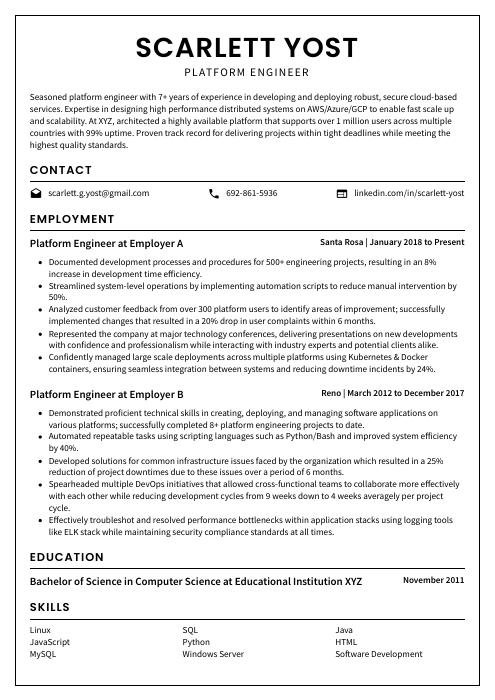 Cormorant
Cormorant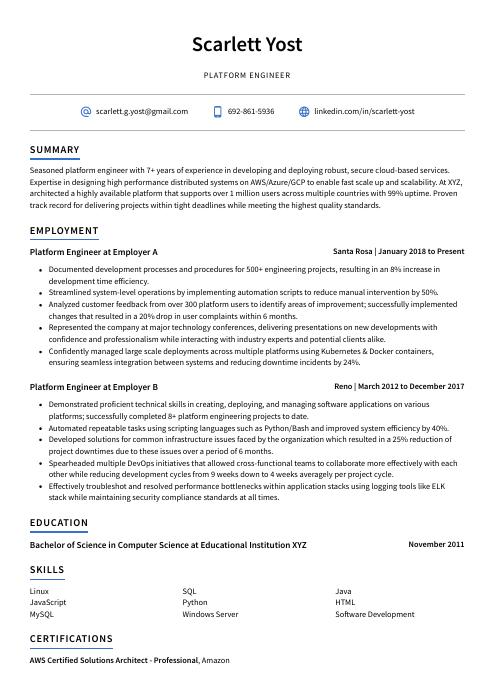 Axolotl
Axolotl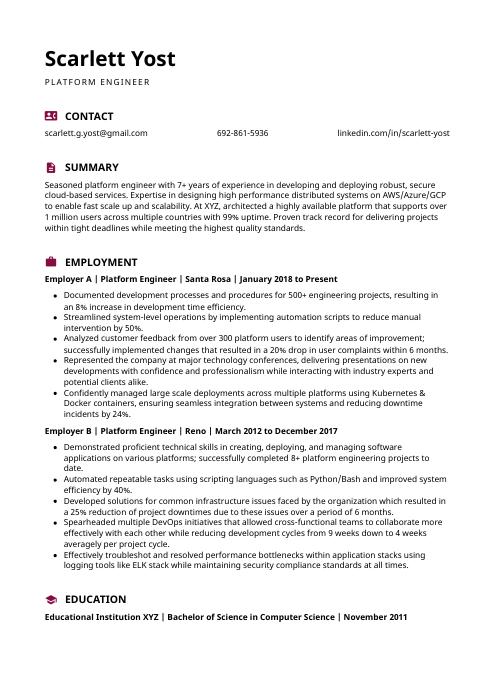 Hoopoe
Hoopoe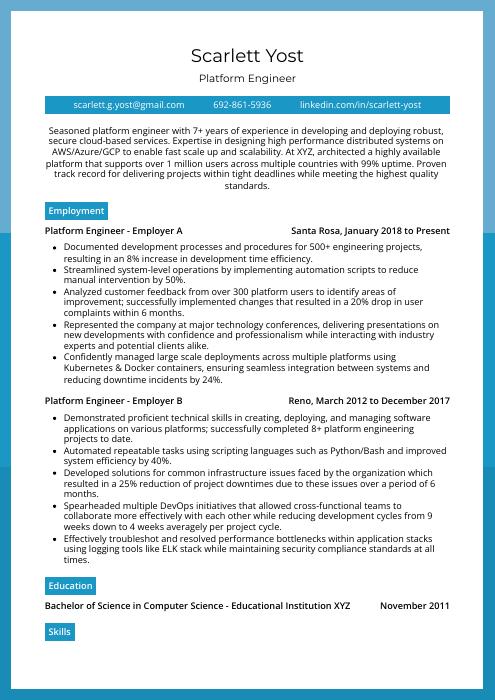 Rhea
Rhea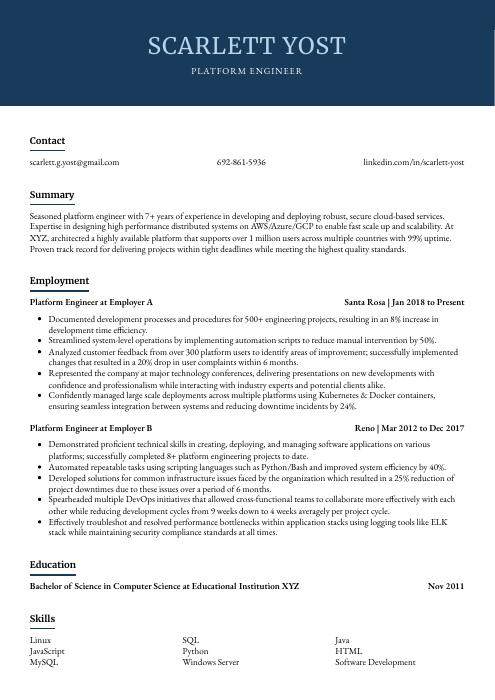 Bonobo
Bonobo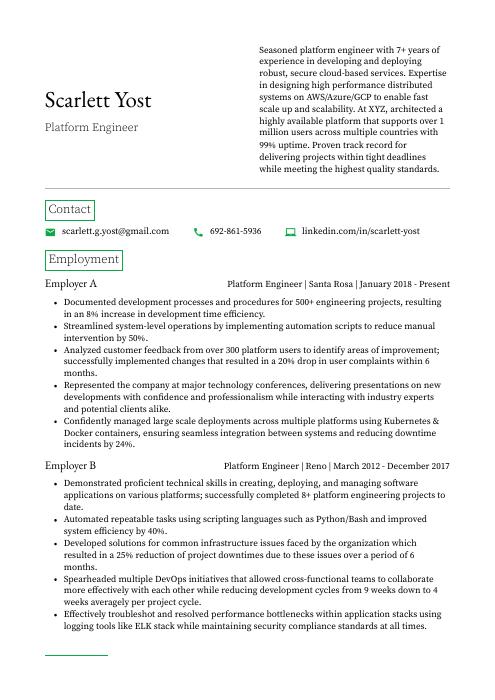 Quokka
Quokka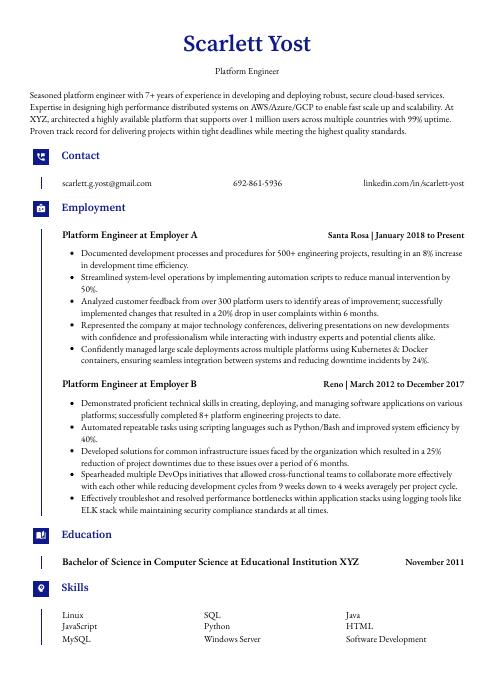 Gharial
Gharial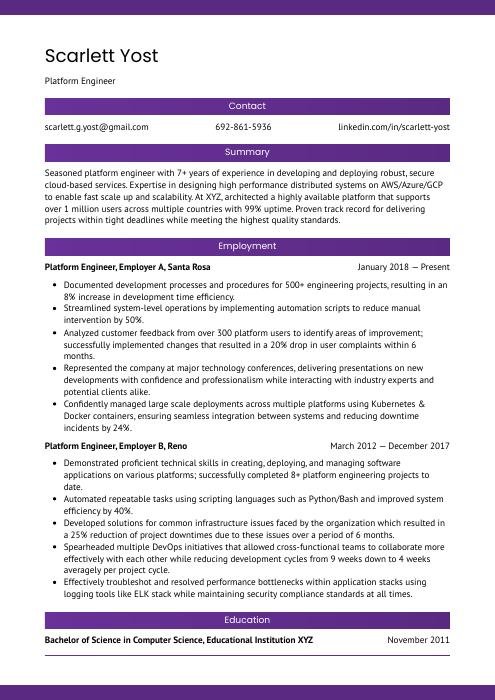 Jerboa
Jerboa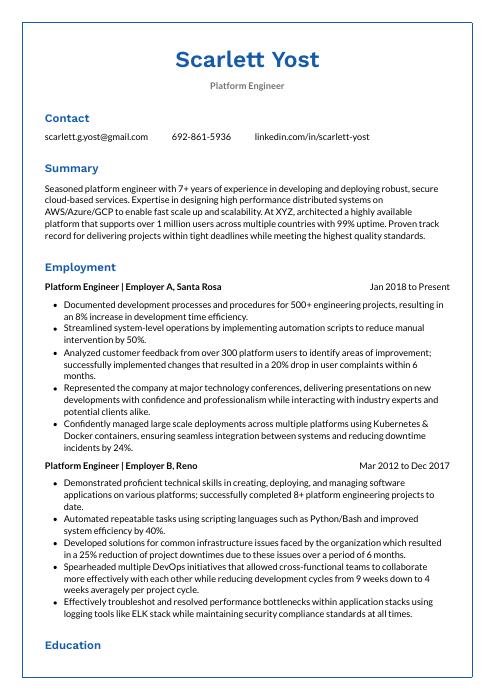 Markhor
Markhor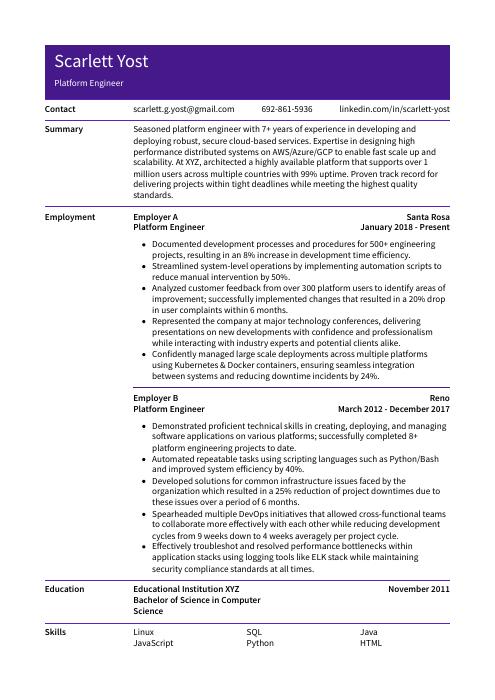 Pika
Pika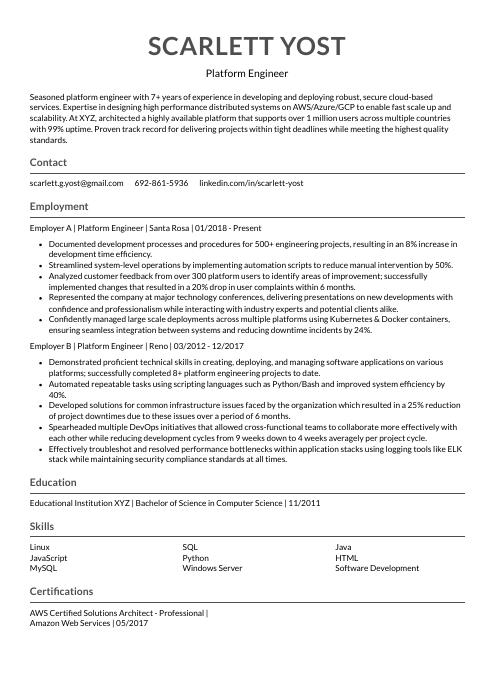 Indri
Indri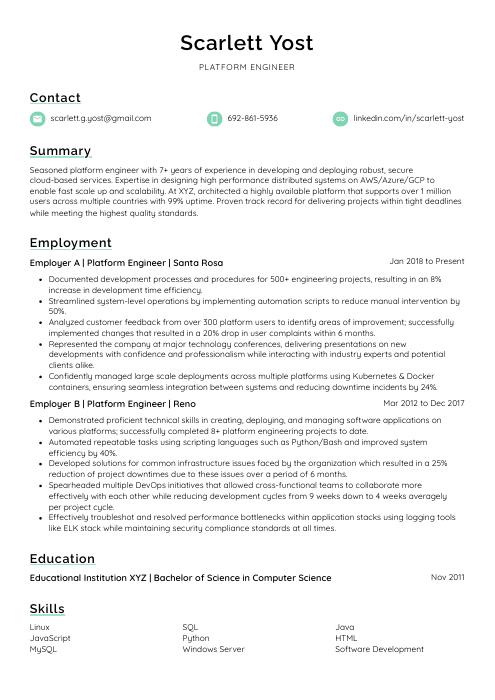 Lorikeet
Lorikeet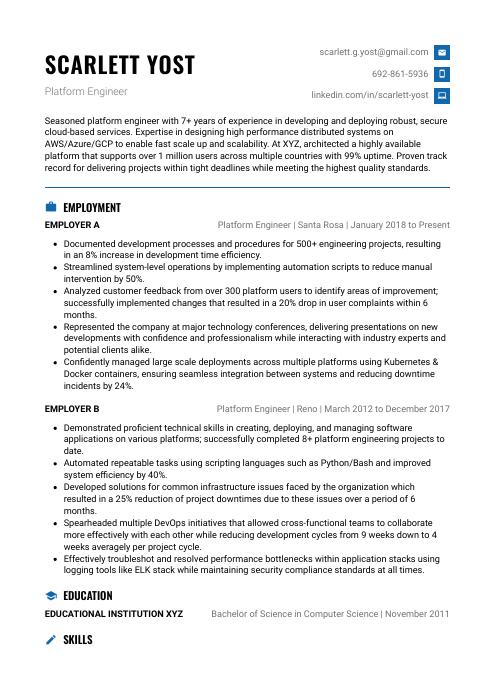 Echidna
Echidna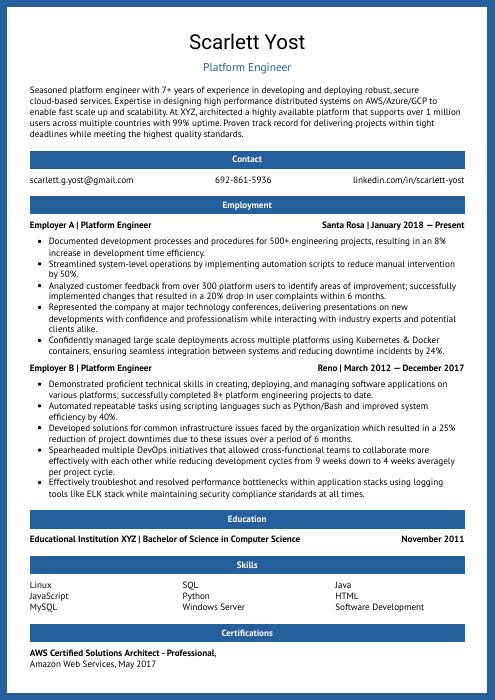 Ocelot
Ocelot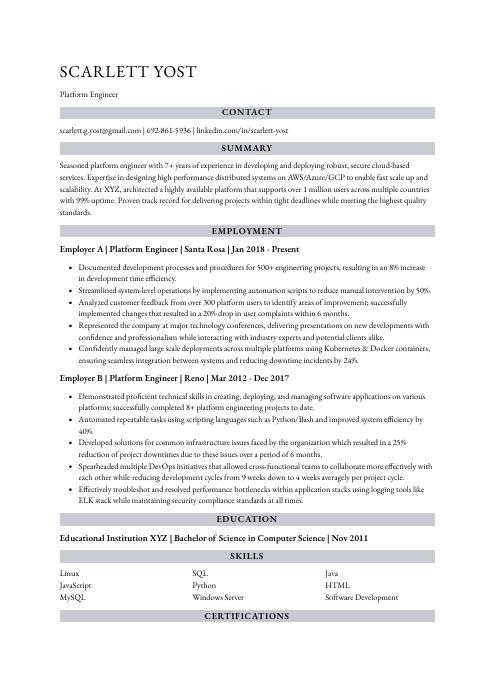 Numbat
Numbat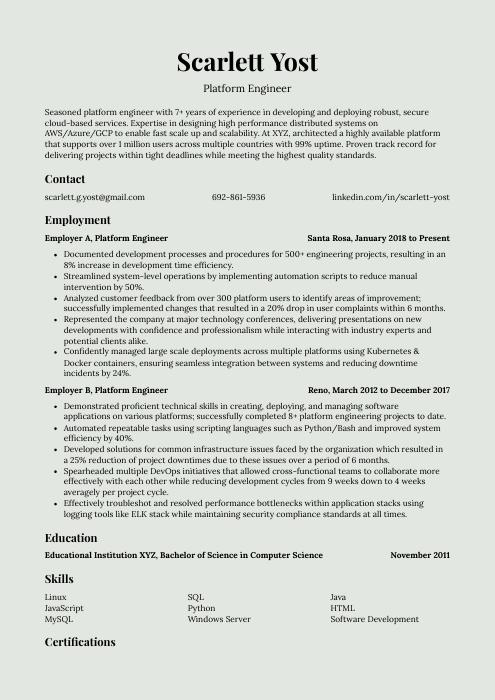 Saola
Saola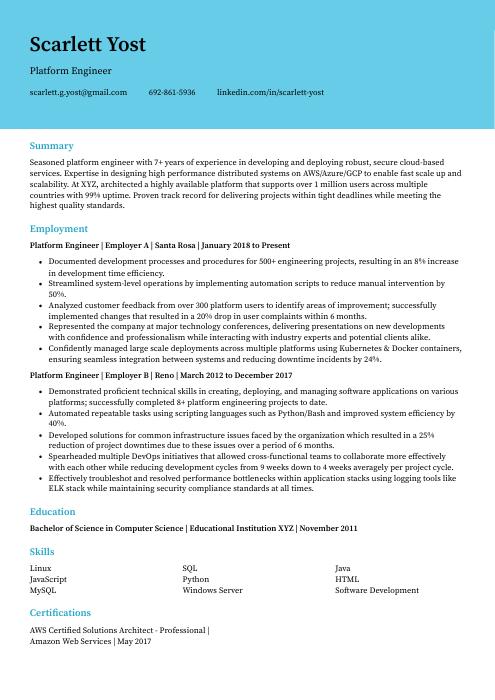 Dugong
Dugong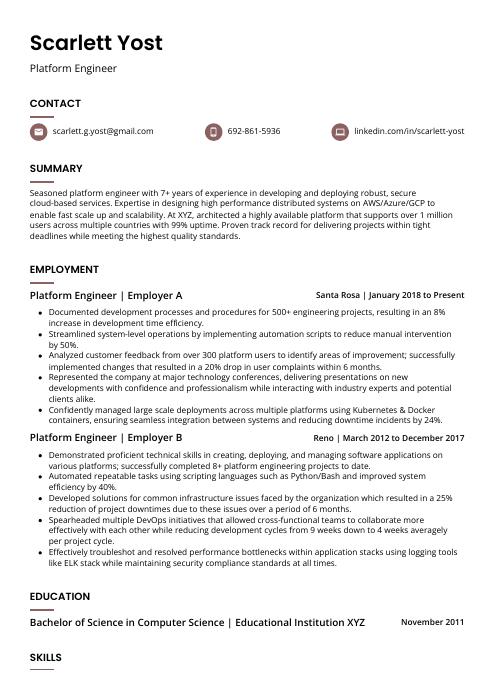 Fossa
Fossa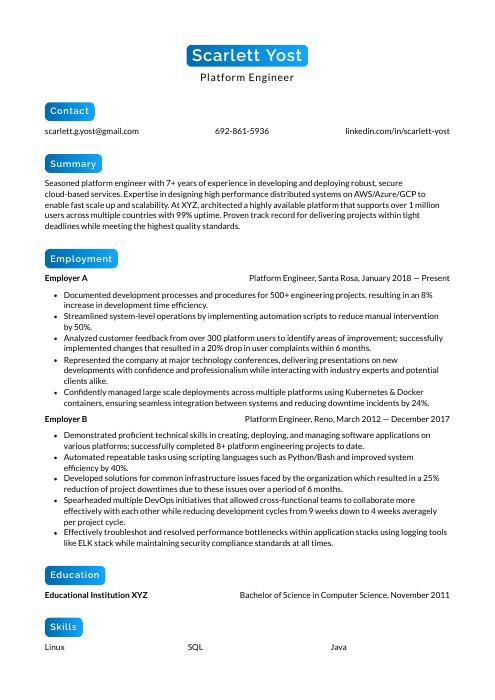 Kinkajou
Kinkajou Rezjumei
Rezjumei
